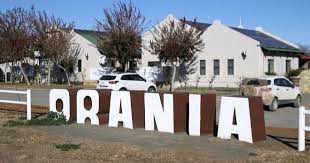Perched delicately on the banks of the Orange River, South Africa, the all-white town is renowned for its own currency and exclusively white community where no blacks reside.
The opposition Freedom Front Plus (FF Plus) party’s support for autonomy or self-determination for parts of South Africa has reignited memories of Orania, a small town in Northern Cape province that has a unique approach to self-determination.
Established in 1991, it serves as an Afrikaner enclave where residents aim to preserve their culture, language and identity.
It is a White Dutch-only enclave and an “independent” country inside South Africa that operates autonomously, with its own institutions, currency – the Ora – and even a school system.
The Ora is only usable in Orania and the local banking institution, the Orania Spaar – en Kredietkoöperatief, oversees the currency.
Black people and other races are not allowed in the enclave. Only people of white Dutch lineage – known as Afrikaneers – can live in the area.
The idea of establishing an Afrikaner-only enclave was mooted when anti-apartheid icon Nelson Mandela was released from jail in February 1990s and it became clear that black-majority rule was on the cusp.
At that time, some racist Afrikaner colonisers feared that impending transition to democracy would threaten their land holdings and continued use of Afrikaans as a language in South Africa.
They decided to pool resources to create Orania to guard themselves against an imaginary “genocide against White South Africans.”
Orania stands as an example of extreme self-determination within the broader context of multicultural South Africa.
While the FFP’s manifesto does not explicitly state support for Orania, parallels can be drawn.
Both advocate for reduced government intervention and increased local autonomy.
Campaign group CapeXit echoes the sentiments of Orania, albeit on a larger scale and – hopefully – without the skin colour segregation.
As South Africa gears up for the 2024 elections, the FF Plus manifesto rekindles debate on the need for autonomy or self-determination for parts of the country.
The manifesto launched earlier this month, emphasises the urgent need for a new political dispensation at the heart of which lies the concept of self-determination, particularly in the Western Cape and other regions.
“We urgently need a new political dispensation that truly recognises South Africa’s diversity; such recognition is a vital building block for achieving true unity in diversity,” the manifesto reads in part.
The FF Plus acknowledges that no single solution fits all circumstances, with different regions requiring tailored approaches; hence it supports various initiatives, including CapeXit, which advocates for independence of the Cape region.
“That is why the FF Plus supports the various initiatives promoting these solutions, including CapeXit,” the party says in the manifesto for the May 29 poll.
CapeXit is an organisation calling for a referendum on Cape Region independence.
According to CapeXit promoters, the vision is to have the Cape Region of South Africa declared as a “non-racial” independent country. It says the Cape Region comprises Western, Northern and parts of the Eastern Cape provinces.
The target is to start with independence of Western Cape and co-opt the other constituent parts of the proposed Cape Region over time.
FF Plus believes people of the Western Cape have the constitutional right to self-determination.
“It is important that registered voters in the Western Cape are afforded the opportunity to express their views on the path of self-determination that they wish to take to greater independence and decision-making about their future, which could ultimately lead to autonomy and possible independence,” the manifesto says.
JN/APA


